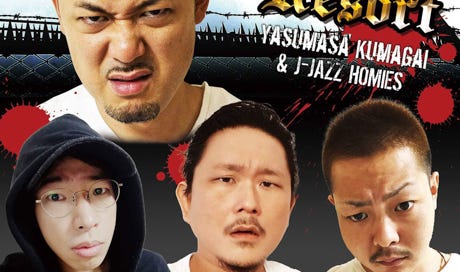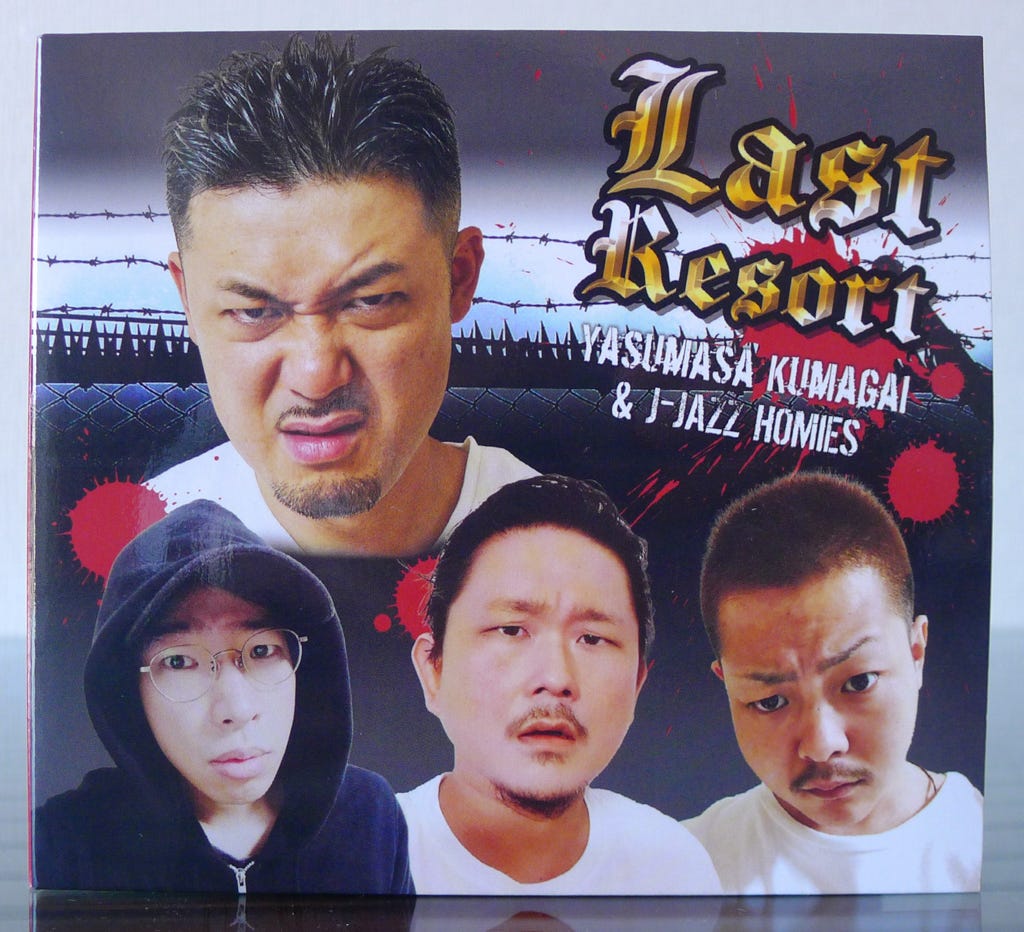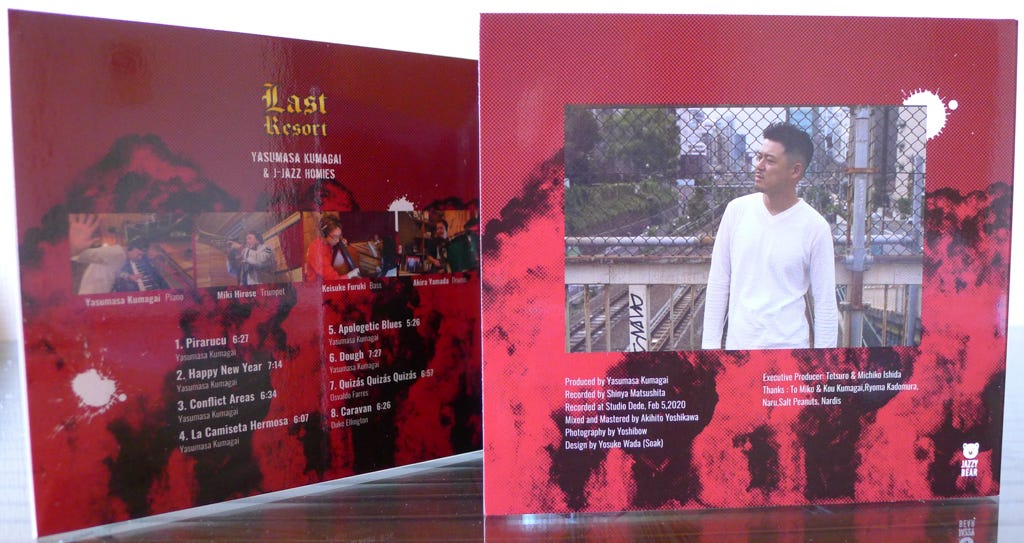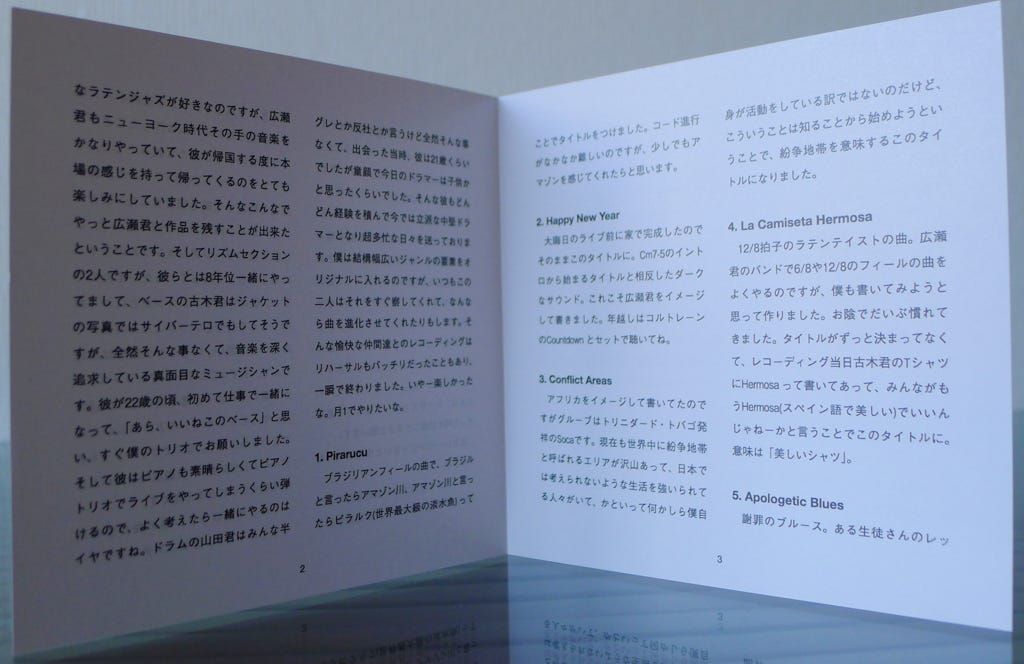Yasumasa Kumagai & J-Jazz Homies: Last Resort
The latest album from J Jazz pianist Yasumasa Kumagai is titled Last Resort, released in 2020 on his own independent label with his jazz piano trio plus Miki Hirose on trumpet. Although the eye-catching cover design may be a world away from typical jazz albums, the aggressive, tongue-in-cheek image succeeds in standing out, a conscious attempt to challenge flagging CD sales in recent years by piquing interest and possibly head-scratching confusion.
This album follows his previous release J-Straight Ahead after five years. The pianist and composer Kumagai regularly records as a trio on his albums, but his main motivation this time was to change to a quartet setting for all songs. Similarly, the overall sound changes very slightly as well, towards Latin-inspired modern jazz — not straight Latin jazz, but modern-day straight-ahead jazz with a variety of spicy influences. Like the playing and concepts that listeners loved on his previous releases, it’s still Kumagai’s music, combining his lively playing with hummable melodies and gripping beats, infused with hues of hip-hop music and personality. Particularly, Kumagai’s command of groove, gospel, and Glasper-inspired music is strongly felt as he pulls from his deep well of authentic and modern jazz, and the album is satisfyingly full of smart music, cool improvisation, and groovy bass lines and drum textures.
Kumagai’s originals are always interesting, balancing simple, catchy melodies with more complex rhythms and structures, often in those odd-time meters like 7/4 or 12/8 that invigorate musicians and listeners alike. Last Resort includes six of his new original tunes, with two additional cover songs wrapping up the set, literally: The entire album was recorded over one day with the songs played in order of the track listing. Capturing the day’s progression gives the album the feel of a live performance, and as the tracks progress, the momentum builds and the energy changes, much like a live band playing a setlist on stage. Even the final tune, “Caravan”, has the feel of an impromptu, high-energy encore as the song emerges out of an adrenalin-surging drum solo that had started on the previous song, recording both tracks in one continuous take and capping the album (and the recording session) on an intense high note.
Recording all together, in set list order, with a limited time window is challenging, but the quartet had performed together over the previous two nights at live shows, which worked like an extended warm-up and captured the feeling of a mid-tour performance in the recording.
Album highlights include the modern jazz beat of “Pirarucu”, the soca-inspired, dramatic “Conflict Areas”, and the adventurous abandon on the uptempo “Caravan”, an excitingly rearranged version of this familiar jazz standard. The other cover song on the album, “Quizás Quizás Quizás”, is the most clearly Latin-inspired choice and may be well-known to Latin genre fans (incidentally, the song may also sound vaguely familiar to those who remember 90’s alternative rock band Cake’s version of “Perhaps, Perhaps, Perhaps”.)
Liner Notes
(Translated from the original Japanese liner notes written by Yasumasa Kumagai.)
Hey there, Yasumasa Kumagai here. Thanks for buying my CD. It’s actually been five years since my last album as a leader, the second album on my JAZZY BEAR label. The title of the album this time is Last Resort, 最終手段 (saishū shudan: last resort) in Japanese, and if you ask what I mean by that, it’s like this: There’s been a lot of talk recently about CDs not selling these days, so… okay then, I’d better create a crazy design for the cover, right? So I tried to make a jacket that looks like something from a rapper from the southern US. That’s all it means (laughs). For anyone who bought this based on the jacket, this may be like a time when you thought you were buying a cola but, upon tasting it, it turned out to be barley tea.
You can’t do something like this without having your own independent label, right?
By the way, the actual concept of this album is to include trumpet on all the songs. Since I’ve never made an album having a horn player on all the songs, this is a new attempt for me. So I compiled songs with the idea that Miki Hirose would be playing with me. I’ve known him since my New York days, and was often invited to play with his large ensemble over the past several years. His compositions and arrangements are so great that I thought I’d also like to write something similar someday. But suddenly composing for a large ensemble seemed impossible, so I resolved to start by writing with just one horn in mind, the trumpet. That was five or six years ago. Finally, I was able to make this one-horn album. So, on that schedule, I should be releasing a quintet album after another five years, and a large ensemble album in about fifty years.
Also, this time there are more Latin songs. I like contemporary Latin jazz, and Hirose often played in that style while in New York. I always looked forward to seeing him every time he returned to Japan with the authentic feel of that kind of music. And, after all this and that, I was finally able to release something with Hirose.
As for the two rhythm section members, I’ve been working with them for about eight years. Bassist Furuki may appear to be a cyber-terrorist on the album cover, but that’s not the case at all. He is a serious musician who deeply pursues music. When I first performed with him, he was about twenty-two years old and I thought “Wow, this is a great bassist.” I immediately asked him to join my trio. Plus, he’s also a great pianist to the point where he can play live shows as a piano trio, so if you think about it, it should make me pretty uncomfortable to play with him, right?
Drummer Yamada may appear to some as a delinquent or anti-social, but in fact, he’s not that at all. When I first met him, he was about twenty-one years old and so baby-faced that I thought “Is today’s drummer a child?” Steadily gaining more experience through the years, he’s become an excellent mainstay drummer leading a very busy life.
I like to include elements from a wide variety of genres in my compositions, and these two always are quick to grasp the music and make the songs evolve.
Recording with such great friends like these was perfect and over before we knew it, much like the rehearsals. It was so fun… I wish I could do it every month.
Pirarucu
This is a song with a Brazilian feel. Brazil brings to mind the Amazon River, and the Amazon River brings to mind the pirarucu (one of the world’s largest freshwater fish), which I chose as the title for this song. Although the chord progression is a little complicated, I hope that you can sense the Amazon somewhat.
Happy New Year
I finished this song at home right before a New Year’s Eve event, so gave it this title. Starting with a Cm7-5 intro, there’s a dark sound that contradicts the title. I wrote this with Hirose precisely in mind. Try listening to this in a set with Coltrane’s “Countdown” on New Year’s Eve, yeah?
Conflict Areas
I wrote this with the image of Africa in mind and recalling a soca groove from Trinidad and Tobago. There are so many areas around the world called conflict zones where people are forced to live in conditions unimaginable in Japan. However it doesn’t necessarily mean that I am somehow involved in these activities myself, but by starting to know about these things, I ended up choosing the title based on the meaning of conflict zone.
La Camiseta Hermosa
A song in 12/8 time with a Latin flavor. Hirose’s band often plays songs with a 6/8 or 12/8 feel, so I thought I would try to write one myself. Luckily, I’ve gotten quite a bit used to it. This song went untitled for a long time, but on the day of the recording, Furuki was wearing a t-shirt with the word “Hermosa” on it. Everyone thought that this word (meaning “beautiful” in Spanish) would be good, so that turned into the title. It means “beautiful shirt”.
Apologetic Blues
Blues of apology. One time, I had completely forgotten about a student’s lesson and missed the appointment. I wrote this song in the middle of that forgetfulness. It’s a minor blues sort of like Wayne Shorter in the Blue Note era.
Dough
In Japanese, it’s 現生 (gen nama: hard cash). It’s been said that Japan is lagging as the rest of the world moves towards cashless payments. There are still jazz clubs where cash is king and credit card and smartphone payments are not accepted. I tried to capture that 切なさ (setsunasa: bittersweet, wistful, sadness, pain) feeling in a ballad.
Quizás Quizás Quizás
I like Gonzalo Rubalcaba’s arrangement of this Latin standard number that I listened to in middle school, and I tried to arrange it for my style. The ending is the highlight, with such a changed atmosphere that makes you wonder what has been happening up until then.
Caravan
And, continuing from the drum solo of the previous song at the same tempo, it’s this familiar jazz standard number. I also tried to arrange this one with a vivid Latin color. The final two songs were recorded in succession, in one shot. The schedule is complete!
This was my first time to try something new, to record all the songs sequentially in order of the album listing. As for the reason why, I thought it would be interesting to capture the flow of the full day, from beginning to end, in the recording.
That’s all for now. We appreciate your support as we continue to release new albums in the future.
Last Resort by Yasumasa Kumagai & J-Jazz Homies
Yasumasa Kumagai - piano
Miki Hirose - trumpet
Keisuke Furuki - bass
Akira Yamada - drums
Released in 2020 on Jazzy Bear as JZBR-0002.
Japanese names: Yasumasa Kumagai 熊谷ヤスマサ Miki Hirose 広瀬未来 Keisuke Furuki 古木佳祐 Akira Yamada 山田玲
Related Albums
Yasumasa Kumagai: I Need A Change, Too (2008)
Yasumasa Kumagai: Pray (2010)
Miki Hirose: Scratch (2013)
Yasumasa Kumagai: J-Straight Ahead (2015)
Audio and Video
Live version of “Pirarucu”, track #1 from this album:
Live version of “Conflict Areas”, track #3 from this album:
Excerpt from “Apologetic Blues”, track #5 on this album:









